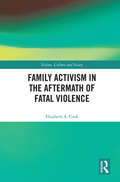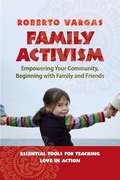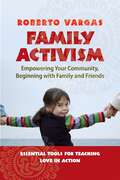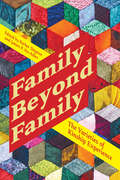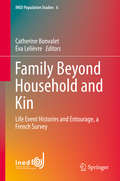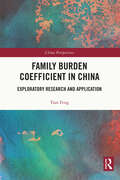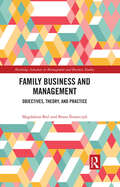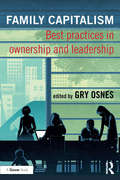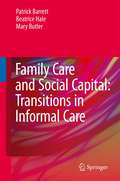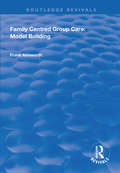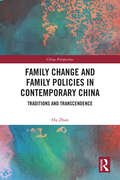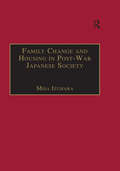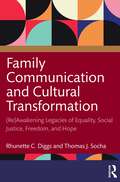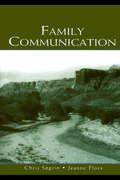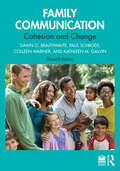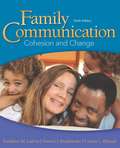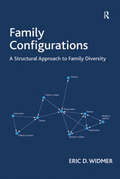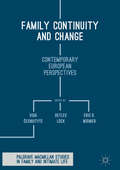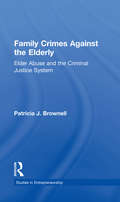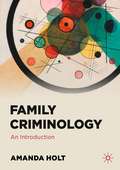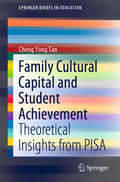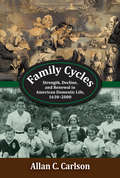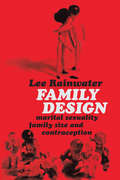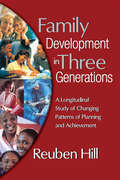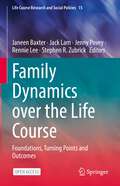- Table View
- List View
Family Activism in the Aftermath of Fatal Violence (Victims, Culture and Society)
by Elizabeth A. CookFamily Activism in the Aftermath of Fatal Violence explores how family and family activism work at the intersection of personal and public troubles and considers what influence family testimonies of fatal violence can have on matters of crime, justice, and punishment. The problem of fatal violence represents one end of a long continuum of violence that marks society, the effects of which endure in families and friends connected through ties of kinship, identity and social bonds. The aftermath of fatal violence can therefore be an intensely personal encounter which confronts families with disorder and uncertainty. Nevertheless, bereaved families are often found at the forefront of efforts to expose injustice, rouse public consciousness, and drive forward social change that seeks to prevent violence from happening again. This book draws upon ethnographic research with those bereaved by gun violence who became involved in family activism in the context of fatal violence: namely, the attempts by bereaved families to manage their experiences of violent death through public expressions of grief and become proxies for wider debates on social injustice. This is an ever more pressing issue in a landscape which increasingly sees the delegation of responsibility to families and communities that are left to deal with the aftermath of violence. An accessible and compelling read, this book will appeal to students and scholars of criminology, sociology, cultural studies, and all those interested in learning more about the after-effects of fatal violence.
Family Activism: Empowering Your Community, Beginning with Family and Friends
by Roberto VargasWe tend to focus on trying to solve big societal problems, the big barriers that separate us, but, as Roberto Vargas argues, the most promising path to change is actually the most accessible and the most universal: the family.
Family Activism: Empowering Your Community, Beginning with Family and Friends
by Roberto VargasWe live in a world that needs radical transformation if our children and grandchildren are to live healthy, peace-filled lives. But where to start? In this inspiring new book, activist Roberto Vargas says the answer lies surprisingly close: at home, with our closest relationships. In our daily lives we experience countless opportunities to empower, inspire, and support positive change in those around us. In Family Activism Vargas explains how fostering what he calls familia—close, loving connections with our relatives and with those we choose to call family—can help us develop the skills and attitudes we need to tackle broader problems in our community, our nation, and the world. Vargas explains the ideas underlying the familia approach and the techniques that support it using examples from his own life, some of them very emotionally charged. He does more than just describe practices like the family council, unity circles, and family ceremonies—he shares how they transformed him as a husband, father, son, brother, friend, and as a committed community activist. Each chapter ends with a series of questions that will help readers understand these practices more deeply and apply them inside and outside of the family.
Family Beyond Family: The Varieties of Kinship Experience
by Parker Shipton and James P. Ito-AdlerArguably all humans invent or accept forms of family beyond those that are close biological kin. These fictive forms of kinship may vary across diverse cultures and serve different purposes. This book explores a wide variety of such kinship-forming, from expedient daylong pseudo-marriages to notions of deities as everlasting parents for humankind and life on earth. These range from the purely abstract to the bricks and mortar of college fraternities and sororities. Family Beyond Family observes and examines the principles and purposes of such fabricated connections.
Family Beyond Household and Kin
by Catherine Bonvalet Éva LelièvreThis book analyzes the family and residential trajectories of men and women across the twentieth century, which are placed in a long-term generational perspective and in the historical context where they played out. It brings together a set of studies based on data from the Biographies et Entourage (Life Event Histories and Entourage) survey conducted by the Institut National d'Etudes Démographiques (INED) on a representative sample of nearly 3,000 residents of the Paris region born between 1930 and 1950. Inside, readers will discover an insightful analysis of the family that moves away from such traditional concepts as the household or main residence and proposes new ones like the entourage and the residential system. This innovative approach to the family network describes an affective and residential proximity that takes into account the relatives and close friends who have played or continue to play a role in an individual's life. The book first presents a detailed analysis of the Biographies et Entourage survey respondents' parental universe and proposes a practical approach to the notion of parenthood that reveals the family and non-family resources available to individuals. Next, it describes the evolution of the respondents' family networks, both in and beyond the household, and details how these family circles shape their subjective judgments during childhood, adolescence, and adult life. Coverage then goes on to examine the family ties of older adults, the role of grandparents and step-families, the importance of family spaces including often frequented places, and inter-generational family solidarity. Families extend well beyond the walls of the home. Interpersonal relations are constructed throughout the life course and in all the settings where they play out. This book takes this new family reality into account and traces its dynamics across time and space. It provides essential tools for researchers looking to conduct life event history surveys and to develop innovative areas of research in the social sciences.
Family Burden Coefficient in China: Exploratory Research and Application (China Perspectives)
by Tian FengThis book is a quantitative study of families in China that focuses specifically on the family burden coefficient. The aim is to provide a simple and accurate calculus for describing the level of family burden and thus provide guidance for policy. The topics explored include changes in China’s family and social policy, the complexity of definitions and concepts relating to the family, the theoretical and practical significance of the family burden coefficient, how that coefficient is measured based on population size at different scales, how measurement can be improved by factoring in types of family burden, and how families can be classified according to their burden profile. The relationship between the family life cycle and family burden coefficient is also addressed before policy solutions are discussed. This book will be of interest to students and scholars in sociology, Chinese studies, and family studies.
Family Business and Management: Objectives, Theory, and Practice (Routledge Advances in Management and Business Studies)
by Beata Ślusarczyk Magdalena BielFamily Business and Management: Objectives, Theory, and Practice characterizes the specificity of the functioning of family businesses through the prism of their objectives. It contains both theoretical considerations about the essence of family entrepreneurship and the objectives set by family businesses, as well as the results of a survey conducted among family business managers. The study concerned the objectives of family businesses and made it possible to confront the planned objectives with those actually implemented by these entities. Thanks to this approach, it is possible to assess the effectiveness of management, taking into account both business and non-business (family) aspirations. The classification models created in the course of the analyzes additionally help to organize the population of family businesses and better understand its diversity. The book also shows the impact of succession plans on setting objectives, as well as the importance of the management styles used in the implementation of objectives set by family businesses. This book will be valuable to students at an advanced level, academics, and practitioners. It addresses the topics with regard to management and organizational studies and will be of interest to organizational scholars, consultants, and leaders interested in establishing and realizing goals in family business.
Family Capitalism: Best practices in ownership and leadership
by Gry OsnesIn most countries family businesses make up between 50 - 95% of business entities. Families control 30% of the Fortune 500 companies. These owners and their businesses are often an important part of the social fabric in local communities, and increasingly the international economy. Despite this, Family Capitalism, or ownership, has been seen as synonymous with stagnation, conflict and crises. The authors focus on how family owners avoids these pitfalls, and how emotional resources develop strategizing capacities. The book explores how successful family businesses innovate and create Visionary Ownership, and implement it. Two crucial leadership capacities are introduced; Leadership of Paradox and Distributed Leadership. A renewed understanding of family businesses show how the family can generate unique strategic advantages in stewardship, succession, long-term thinking, risk management and building social capital. It shows a different perspective regarding value creation in the economy. The book provides new insights for family owners, advisors, leaders as well as scholars. The findings are from a best-practice research project with cases from China, USA, Germany, Colombia, Israel, Tanzania, France and Sweden. Applying strategy-as-practice theory shows how family owners, across different cultures and sectors, use generic ownership strategies and experiment, such as with cluster ownership and creating new ventures in succession.
Family Care and Social Capital: Transitions in Informal Care
by Patrick Barrett Beatrice Hale Mary ButlerBecoming a caregiver is increasingly an inevitable experience for many people and, therefore, a likely life transition. Drawing on research and personal experiences of working with family caregivers, this book examines a range of family caregiving situations from across the life course. It seeks to capture the dynamics of caregiving in a number of common situations: caregiving during infancy, for adults who acquire a disability through accidents or illness, for older people with age-related issues, and caregiving by children and adolescent carers and grandparent carers. In drawing attention to key moments of vulnerability faced by family and informal caregivers, and by suggesting how to assist 'reconnection' at these moments, the book provides a guide for those working in the area of health, disability and care. Informal care is conceptualised as occurring with the context of personal interrelationships, these being nested within wider kin networks and linked with wider professional formal care networks. Informal care is seen both as an expression of social capital and as an activity that builds social capital. It is an indicator of resources of mutual support within social networks, and it has the effect of adding to the stock of social resources. The book makes a case, therefore, for facilitating the development of social capital by strengthening the capacity of informal caregivers and caregiver groups, and by improving the linkages with formal care organisations.
Family Centred Group Care: Model Building (Routledge Revivals)
by Frank AinsworthPublished in 1997, this study focused on building and empirically validating a model of family centred group care. This is an alternative to the traditional model of group child care that is primarily child centred and which reflects the notion of group care as a substitute for parental care. The model represents a step forward in the conceptualization of group care practice as both child centred and family affirming. The Family Centred Group Care instrument used in the study is unique in that this is the first to measure a model of group care empirically. The book will be of interest to child welfare practitioners, social workers, child care workers and other human service personnel as well as managers of agencies that provide group care services for children and at-risk youth. Researchers and policy makers will also find this book useful as the study advances the application of empirical methodology to human service programs.
Family Change and Family Policies in Contemporary China: Traditions and Transcendence (China Perspectives)
by Hu ZhanThis book examines the dramatic transformation of Chinese families in recent decades, analyzing how economic and social policies and changes have reshaped family structures and relationships.The book explores government policy responses to emerging family- related challenges while balancing traditional values with modern realities.In seven detailed chapters, the author explores key aspects of China’s family evolution, including changing family structures, intergenerational dynamics, social services, and institutional reconfiguration. The work provides an in- depth analysis of how policies have adapted to address population aging, shifting. Special attention is given to the delicate balance between preserving traditional family values and accommodating inevitable demographic and economic changes.This title will be essential reading for scholars, policymakers, and students of Chinese studies, sociology, and social policy. It will also provide valuable insights for anyone interested in understanding contemporary Chinese society and family dynamics.
Family Change and Housing in Post-War Japanese Society: The Experiences of Older Women
by Misa IzuharaThis book explores the experiences of older women in post-war Japanese society through analysis of their family and housing histories. Three broad themes - family relations, welfare systems and housing - were chosen to highlight issues surrounding the changing role and position of women in the family and society. A qualitative approach is used to address a gap in the literature and to illustrate the real-life experiences of women in Japan. Many aspects of the book are comparable, or related, to studies exploring other industrial and East Asian societies and the book thus contributes to international debates surrounding housing policy, the ageing society and the changing nature of the family. It also provides useful insights into and analysis of, Japan’s society and socio-economic system.
Family Communication and Cultural Transformation: (Re)Awakening Legacies of Equality, Social Justice, Freedom, and Hope
by Thomas J. Socha Rhunette C. DiggsBuilding on their past work in race and family communication, Rhunette C. Diggs and Thomas J. Socha gather in this volume contemporary theory and research concerning ways that families use communication to transform inherited cultural legacies for the better (Communication 3.0). The book expands the field of communication’s understanding of the life-long impact that family communication has on the managing diverse and clashing cultural relationships, identities, meanings, and communication practices. It spotlights the economically disenfranchised alongside the economically secure, the systematically oppressed next to beneficiaries of Whiteness, and those actually or metaphorically killed and or threatened by violence and hateful systems outside of home. Together, the contributions address omissions of diverse family contexts in family communication research and reconsider qualitative and quantitative approaches that bring respect and equality to the participant-researcher relationship. This book is suitable as a supplementary text for courses in family communication, family studies, race and ethnicity in communication, and intergroup communication.
Family Communication: Chris Segrin (Lea’s Communication Series)
by Chris Segrin Jeanne FloraFamily Communication carefully examines state-of-the-art research and theories of family communication and family relationships. In addition to presenting cutting-edge research, it focuses on classic theories and research findings that have influenced and revolutionized the way scholars conceptualize family interaction. This text offers a thorough and up-to-date presentation of scientific research in family communication for both teachers and students of family communication as well as professionals who work with families.<P><P> This second edition features:<P> * Chapters updated with the latest research, including over 2000 references.<P> * Material on understudied family relationships, such as extended family relationships and gay and lesbian relationships<P> * Recent research on understudied topics in family communication, including the influence of technology on mate selection, negotiating work and family stress, single parenting, cohabitation, elder abuse, forgiveness in marriage, and the links among communication, culture, and mental health.<P> * A revised chapter on parent-child communication, taking a lifespan perspective that helps organize the large body of research in this area.<P> * A new chapter devoted to extended family relationships, with special focus on grandparent-grandchild relationships, in-law relationships, and adult children and their parents.<P> * An expanded review of family conflict processes, especially in relation to decision making and power.<P> A companion website provides chapter outlines, exam questions, and PowerPoint slides for students and instructors. Undergraduate readers should find the information easy to understand, while advanced readers, such as graduate students and professionals, will find it a useful reference to classic and contemporary research on family communication and relationships.
Family Communication: Cohesion and Change
by Dawn O. Braithwaite Kathleen M. Galvin Paul Schrodt Colleen WarnerNow in its eleventh edition, Family Communication: Cohesion and Change continues to provide students with a foundational, accessible, and inclusive overview of the family communication field.The eleventh edition represents the plurality of today’s families, helping students see themselves and think through how the up-to-date research and theory apply to their lives. It features a more concise narrative with streamlined key concepts that are more straightforward and engaging for students. Now presented in three sections, Communication and Family Lenses, Communication and Family Cohesion, and Communication and Family Adaptability, this edition’s new features include learning objectives for each chapter, Family Portrait interviews with top scholars, a glossary of key definitions, and expanded Family Reflections discussion questions interspersed in the text.This book is ideal for undergraduate courses in family communication, allied subjects in communication studies, family studies, nursing, and social work programs.The accompanying Instructor and Student Resources provide free digital materials designed to test students’ knowledge and save instructor time when preparing lessons. Please visit www.routledgelearning.com/familycommunication for interactive activities, practice quizzes, and more.
Family Communication: Cohesion and Change
by Kathleen M. Galvin Dawn O. Braithwaite Carma L. BylundAddresses the role of communication in developing and maintaining functional, diverse family relationships Family Communication: Cohesion and Change encourages students to observe family interaction patterns analytically and relate communication theories to family interaction Using a framework of family functions, first-person narratives, and current research, Family Communication: Cohesion and Change emphasizes the diversity of today's families in terms of structure, ethnic patterns, and developmental experiences. MySearchLab is a part of the Galvin/Bylund/Braithwaite program. Research and writing tools, including access to academic journals, help students understand critical thinking in even greater depth. To provide students with flexibility, students can download the eText to a tablet using the free Pearson eText app. Note: this is the standalone book, if you want the book/access card order the ISBN below: 0133814998 / 9780133814996 Family Communication: Cohesion and Change plus MySearchLab with eText -- Access Card Package Package consists of: 0205239927 / 9780205239924 MySearchLab with Pearson eText -- Valuepack Access Card 0205945236 / 9780205945238 Family Communication: Cohesion and Change
Family Configurations: A Structural Approach to Family Diversity
by Eric D. WidmerFamily Configurations develops current scholarship on families and intimate lives by demonstrating that family relationships, far from being fluid and inconsequential, are more structured and committed than ever. Based on a series of empirical studies carried out in the US and Europe, this volume reveals the diversity of family relationships that emerge as a result of various key family issues, emphasizing the supportive and disruptive interdependencies existing among large sets of family members beyond the nuclear family. By applying social network methods to uncover the relational patterns of contemporary families, and making use of rich empirical data, this book draws on recent developments in family sociology, social network analysis and kinship studies to present a fascinating interdisciplinary approach to the family.
Family Continuity and Change
by Eric D. Widmer Vida Česnuitytė Detlev LückThis volume provides readers with recent sociological approaches to family understanding, theorising and practices within the context of continuities and change, both across generations and during individual life courses. The contributors uniquely investigate the friction between persisting family needs and changing circumstances, between holding on to traditional family norms and adapting to fast-changing demands. Authors from nine countries develop and apply innovative theoretical and methodological approaches for a more differentiated description of European family lives at the beginning of the 21st century, and show that family sociology has achieved significant commonalities across national borders in Europe, thus helping our understanding of complex family realities. The book will be essential reading for students and scholars with an interest in family and intimate life, family sociology and policy, sociology and gender studies.
Family Crimes Against the Elderly: Elder Abuse and the Criminal Justice System (Garland Studies on the Elderly in America)
by Patricia J. BrownellFirst Published in 1999. Routledge is an imprint of Taylor & Francis, an informa company.
Family Criminology: An Introduction
by Amanda HoltThis full-colour textbook offers a fresh conceptual approach to understanding the intersections of crime, criminal justice and family life. In doing so, it proposes a brand new sub-discipline of Criminology that places the family at the heart of its analysis, offering a groundbreaking approach to the study of crime and deviance. Adopting an interdisciplinary perspective, this introductory text explores topics from across the spectrum of criminological scholarship, including youth justice, prisons, organized crime, family violence and homicide, and victimology. By drawing together these distinct topics and identifying and discussing their familial connections, this book argues for the importance of family life in the theory and practice of crime and justice. Key questions discussed throughout the text include: How does the criminal justice system engage with families across different contexts? In what ways do crime and criminal justice processes impact on family life? In what ways can families transform the criminal justice system for the betterment of all? This book challenges commonly-held and simplistic assumptions about what the family is in relation to crime and justice and, by doing so, engages in deeper debates about human rights, social justice and the role of the state in relation to families and crime. It includes pedagogic features including conceptual toolboxes, questions for reflection, textboxes, a glossary and interviews with practitioners.
Family Cultural Capital and Student Achievement: Theoretical Insights from PISA (SpringerBriefs in Education)
by Cheng Yong TanThis book focuses on the relationship between cultural capital and student achievement. It fills the gap in the literature on large-scale quantitative studies of the effects of cultural capital. In particular, the review of empirical evidence presented, especially that from studies analyzing large-scale, international data from the Programme for International Student Assessment (PISA), makes a substantial contribution to the literature. This review addresses the knowledge gap on reviews investigating the effects of different forms of cultural capital on student achievement as compared to the more established evidence base in the related field of socioeconomic status.
Family Cycles: Strength, Decline, and Renewal in American Domestic Life, 1630-2000 (Marriage And Family Studies Ser.)
by Allan C. CarlsonIn this paradigm-shifting volume, Allan C. Carlson identifies and examines four distinct cycles of strength or weakness of American family systems. This distinctly American family model includes early and nearly universal marriage, high fertility, close attention to parental responsibilities, complementary gender roles, meaningful intergenerational bonds, and relative stability. Notably, such traits distinguish the "strong" American family system from the "weak" European model (evident since 1700), which involves late marriage, a high proportion of the adult population never married, significantly lower fertility, and more divorces.The author shows that these cycles of strength and weakness have occurred, until recently, in remarkably consistent fifty-year swings in the United States since colonial times. The book's chapters are organized around these 50-year time frames. There have been four family cycles of strength and decline since 1630, each one lasting about one hundred years. The author argues that fluctuations within this cyclical model derive from intellectual, economic, cultural, and religious influences, which he explores in detail, and supports with considerable evidence.
Family Design: Marital Sexuality, Family Size, and Contraception
by Lee RainwaterWhy do contraceptive practices work for some couples and not for others? How do couples decide the number of children they want? What are the implications of family design in terms of the "population explosion?"Family Design is a thoroughly documented study undertaken by Social Research, Inc., for the Planned Parenthood Federation of America. Based on intensive interviews with 409 husbands and wives, it applies the framework of family sociology to a problem that has previously been studied mainly from the demographic point of view.
Family Development in Three Generations: A Longitudinal Study Of Changing Patterns Of Planning And Achievement
by Reuben HillFamily Development in Three Generations is an unusual kind of multi-generational gathering--the result of a massive, in-depth research effort. It is based upon Hill's personal interviews conducted with over 300 families during the course of a year. The discussion results from these interviews, from the statistical information that they produced, and from Hill's consultation with five other fellow researchers. This scholarly contribution to the family field thoroughly analyzes the complexities of the modified generational network. As a multi-generational study, it is pervaded by the vigorous spirit that usually characterizes such research.In his preface to Family Development in Three Generations Reuben Hill invites the reader "to drop in on any generational gathering" where "you will hear how much better or worse life was in grandfather's day than today." Such discussions are usually controversial and center upon shared experiences. Such rhetoric, polemic, and energy sustain conversations among generations.Family Development in Three Generations penetrates to the life center of intimate change in American society. It is a wide-ranging volume that presents varied and highly significant insights into many fields. Scholars will find it a vital contribution to their knowledge of the subject and laymen will find it full of valuable information that they can profitably apply to their own families. The work is widely recognized as a classic in longitudinal analysis of family life.
Family Dynamics over the Life Course: Foundations, Turning Points and Outcomes (Life Course Research and Social Policies #15)
by Janeen Baxter Jenny Povey Jack Lam Rennie Lee Stephen R. ZubrickThis open access book examines how families and other social institutions interact to shape outcomes over the life course. It considers how to use research evidence to reduce social disadvantage through translation of evidence to support public policies and programs. The chapters focus on key life course stages such as early child development, adolescence, emerging adulthood, parenting, marriage, relationships and ageing, as well as examining experiences and outcomes for selected social groups such as Indigenous children, migrants and refugees, and gay, lesbian and bisexual groups. The book presents evidence using high-quality and recent data. With a focus on Australia, the volume provides new insights into how context shapes life course pathways and outcomes and a contrast to work that typically focuses on Europe and the United States. It will be of value to anyone interested in understanding how family background and life course pathways influence social disadvantage.
